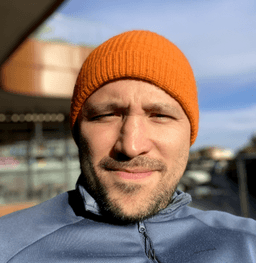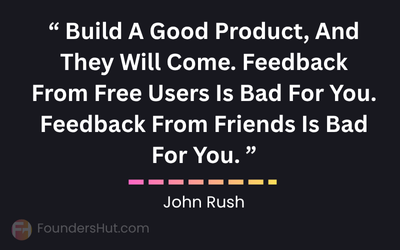How John Rush Revived a SaaS Startup: From Acquisition Slump to 44% Revenue Growth in 20 Months


Business Description
Table of Contents
Navigate through the case study sections
Executive Summary
Case Study Content
Stuck with a Declining SaaS? Here’s How John Rush Turned It Around
What happens when you buy an $800,000 SaaS company and everything drops within the first month? That’s what hit John Rush after he acquired Unicorn Platform, a no-code website builder for startups, in June 2022. The business, well-known for its crisp landing pages and ease-of-use, suddenly faced bugs, outages, and customer exodus. Most would have panicked or tried to sell. John did something different: he admitted what went wrong, dug deep for fixes, and then engineered a comeback that would lift monthly revenue by 44% in less than two years.
Buying at the Peak, And Paying the Price
John wasn’t new to startups. With experience in more than 30 companies, founding, co-founding, or leading tech teams, he was eyeing the no-code sector for his next move. When he spotted Unicorn Platform, already a product he liked and used, he saw an opportunity to buy instead of build. He spent three months on due diligence, tracking every metric, and eventually agreed on an $800k deal with the solo indie-founder. This was about 5x trailing twelve months revenue, a standard for SaaS in 2022, though, as John would admit later, the price was steep.
The team behind Unicorn Platform was small: primarily the original founder and some freelance help. The transition was supposed to be smooth: the seller even stayed on after the sale briefly. But issues in the codebase and systems began surfacing immediately after closing, and John realized he’d inherited a “house of cards.” Weak infrastructure, no real engineering team, and a userbase attached more to the founder than the product.
Churn, Bugs, and Revenue on Fire
Within weeks, monthly recurring revenue fell from $16,000 to $14,000, and churn jumped. Customers were frustrated by poor uptime, bugs, and slow support, not what you want right after a big price tag. The core developer team (essentially just the old founder plus his freelancers) couldn’t fix critical problems. John’s VC-backed experience hadn't prepared him for this style of indie SaaS, where technical shortcuts are common.
Losing the original founder actually made things worse. He'd been the operations, marketing, and "face" of the brand. Many customers left just because he was gone. John, focused on technical fixes, let promotion and customer outreach slip. Organic growth stalled. It looked grim.
The Turnaround: Talk to Users, Move Fast
Instead of watching churn eat away what was left, John flipped strategy. First, he automated outreach to every user cancelling their subscription, and then to all paying clients. He ran this through Crisp, the support platform, and collected more than 200 real responses. The biggest complaint? Unicorn Platform looked dead. People thought nobody was building anything new. In reality, work was happening, but it wasn’t visible.
John and his one developer locked in on a two-week "hackathon." They prioritized fast, impactful feature releases that users actually wanted, and immediately announced every change. Not only did this improve the tool, but it sent a clear message: "This business is alive and kicking." Communication, not just code, mattered.
Restarting Growth: Going All In on Content, SEO, and Social
Technical fixes stemmed churn, but real growth needed visibility. Around April 2023, John shifted. He dove into SEO, launching a content campaign full of landing page ideas, startup stories, and guides. Google traffic climbed. On social, John realized the business no longer had buzz. When he bought in, the platform was everywhere on Twitter; by ten months later, silence.
Determined to flip this, John relaunched his personal branding. He started sharing stories, lessons, and product wins on Twitter (X), growing from 72 followers post-acquisition to over 17,000 by late 2023. He wove Unicorn Platform’s journey into every post, humanizing the business. This fed back into site traffic, raised trust, and encouraged more signups and shares.
Lean Team, Massive Leverage
By late 2023, the plan was working. MRR hit $18,000, $2,000 above pre-acquisition levels, bouncing far away from the $14,000 post-crash. By March 2024, MRR soared to $23,000 per month, a 44% lift in just under two years. John now runs Unicorn Platform as a side project, with a single developer and one support agent. Systems finally run smooth. The founder personally focuses only on high-leverage growth and customer engagement.
Key Lessons from the Comeback
- Don’t just rely on the product. The founder’s presence and energy fueled early growth; removing him shook customer trust. If you buy, be ready to step into the gap or expect churn.
- Don’t hope for “passive” growth, even with a solid SaaS. Regular outreach, content, SEO, and updates are essential, particularly just after an acquisition. Automate feedback, close support loops, and never ghost your user base.
- Assume the tech is fragile, especially with indie projects. Do deeper technical diligence, and plan to invest heavily in stability and code repairs.
- Don’t keep the seller around indefinitely. Move quickly to your own team within the first month of acquisition for a fresh start and clear accountability.
- Promotion via storytelling matters, even if you’re technical. Founders who show personal presence humanize the brand and drive social buzz, and it compounds.

How You Might Apply These Moves
John’s journey isn’t just about luck. It’s a case of bracing for worst-case scenarios in acquisition, doing unglamorous feedback work, moving fast on technical debt, and stepping up visibility. If you want to take over a SaaS, remember: it won’t run itself.
Business Plan
Market Problem
After acquiring Unicorn Platform, John Rush faced significant challenges, including a sharp decline in monthly recurring revenue and high…
See the full market problemSolution
John implemented a systematic approach to revive Unicorn Platform by focusing on direct customer feedback and rapid development cycles. He…
See the full solutionTarget Market
Startups
They need a no-code solution for building websites quickly without technical expertise.
Small Businesses
Looking for affordable ways to establish an online presence without hiring developers.
Competitors
Webflow
Offers a powerful no-code website builder with a strong focus on design flexibility.
Wix
Popular for its user-friendly interface and vast template library, appealing primarily to small businesses.
Competitive Advantage
Unicorn Platform differentiates itself by focusing on rapid development and customer-driven updates. John’s experience in startups allows…
See the full competitive advantageSales and Marketing
The marketing strategy centers on content creation, SEO, and social media engagement. John initiated a content campaign that includes…
See the full Sales and marketing planSuccess Milestones
Customer Feedback Initiative
Automate outreach to users to gather insights on pain points and expectations.
Feature Release Hackathon
Implement and announce key updates based on customer feedback to improve product perception.
Key Takeaways
- 1Taking over a SaaS isn’t plug-and-play, founder transitions trigger churn as customers are often more attached to the original owner than the platform.
- 2Don’t wait for organic growth post-acquisition. Proactive feedback loops and customer outreach are critical, especially when user trust is shaken.
- 3Technical stability is a given, indie SaaS acquisitions often hide poor code or shaky infrastructure, so have a plan (and team) ready to address it.
- 4Product development and visible progress updates win back trust. When customers don’t see change, they assume the business is stagnating, even if you’re working hard.
- 5Leveraging content creation, SEO, and personal storytelling dramatically boosts visibility, trust, and user acquisition, compounding over time.
- 6Don’t let a former founder linger, transition to your own hired or core team within 30 days to cement new leadership and accountability.
Key Facts
Tools & Technologies Used
Premium Content Locked
Subscribe to access the tools and technologies used in this case study.
Unlock NowHow to Replicate This Success
Premium Content Locked
Subscribe to access the step-by-step replication guide for this case study.
Unlock NowInterested in Being Featured?
Share your success story with our community of entrepreneurs.
Explore More Case Studies
Discover other inspiring business success stories

How Mike Belasco Scaled Inflow to a $4M+ SEO Powerhouse and Sold It
Mike Belasco built Inflow from a one-man SEO sideline into a thriving, seven-figure e-commerce marketing agency. Over 17...
Inflow

How Electric.Travel Sold for $55,000: Turning a Niche Content Site into Real Profit
Electric.Travel, a niche content and review website focused on electric transportation, attracted 69 watchers and sold f...
Electric.Travel (Now WebBikeWorld)

How 90 Reels Generated $5,400 From Free Social Media Traffic
In this case study, a marketer partnered with trading educator Thomas Kralow to repurpose long-form YouTube content into...
Wolf Of Retro Drops Affiliate Program
